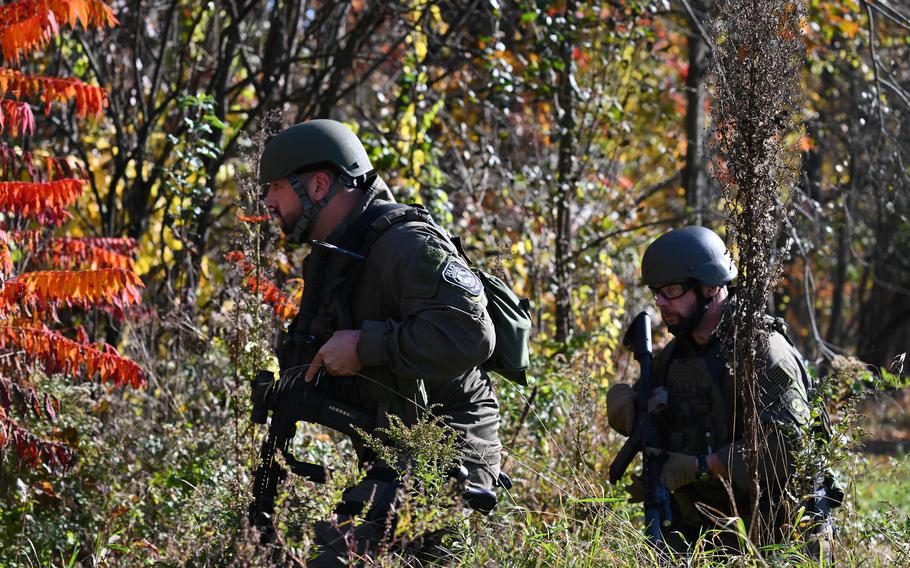U.S.
Who is Robert Card, the suspect in Maine’s deadliest mass shooting?
Los Angeles Times October 28, 2023

Law enforcement personnel approach a home in Monmouth, Maine, on Oct. 27, 2023, in the aftermath of a mass shooting in Lewiston, Maine. Thousands of anxious small-town Maine residents began a second day under lockdown as police waging a sprawling manhunt struggled to find a U.S. Army reservist accused of killing 18 people in America’s deadliest mass shooting this year. (Angela Weiss/AFP/Getty Images/TNS)
(Tribune News Service) — Nearly two days after he allegedly killed 18 people at a bowling alley and bar, the suspect in the deadliest mass shooting in Maine’s history remained at large Friday, eluding a widening police dragnet while residents of Lewiston and surrounding communities sheltered in place.
As local police, federal agents, dogs, divers, boaters and pilots fanned out in search of him, Robert R. Card Jr., identified by authorities as the suspect in the Lewiston mass shooting, remains an unknown.
To the public, Card is the expressionless man captured in surveillance images distributed by the Lewiston Police Department just after the shooting, wearing a brown hooded sweatshirt and baggy cargo pants, his thin, bearded face blank as he grips an assault rifle.
Some details have since emerged about the 40-year-old’s life: service in the U.S. Army Reserves, alleged mental health concerns, a marriage that gave him a son before ending in divorce.
Card lived in Bowdoin, local media reported, about 25 miles east of the scene of the two shootings in Lewiston, which is Maine’s second-most populous city. He divorced his wife in 2007, citing irreconcilable differences, according to the Times Record of Brunswick, Maine.
Card and the woman had a son, who is now 18. An amendment to the divorce judgment required both Card and his ex-wife to keep any weapons “under lock and key” when they weren’t being used, the Times Record reported.
Bryce Dubee, a spokesman for the U.S. Army, said Card enlisted in the Army Reserves in 2002. He was never deployed to combat and served as a petroleum supply specialist, Dubee said. He currently holds the rank of sergeant first class, assignment to the Reserves’ 3rd Battalion, 304th Infantry Regiment in Saco, Maine, Dubee said. Card received various military honors during his 21-year tenure, he added.
However, when Card was deployed this summer to the Army Reserve Unit at Camp Smith Training Center in Cortlandt, N.Y., his commanding officers were so concerned about his state of mind that police were called to take Card to the Keller Army Community Hospital in West Point for evaluation, according to a source who wasn’t authorized to speak with the media and requested anonymity.
It wasn’t clear whether Card was diagnosed with any mental conditions during the evaluation. Law enforcement officials have been told that Card was spending much of his time on antigovernment websites, the source added.
Card’s unit was assigned to support training at West Point in July, Dubee said, but “there are no records to indicate he instructed or participated in any training.”
Just before 7 p.m. on Wednesday evening, police say, Card opened fire inside Just-In-Time Recreation, a bowling alley in Lewiston. Parents hid with their children and patrons fled as seven people were killed.
Twelve minutes after police were alerted to the attack on the bowling alley, they fielded another call about a shooting four miles south at Schemengees Bar & Grille. Among the patrons were a group of deaf people who had come to the bar for a cornhole tournament. Eight people died at the bar. Three more died at hospitals, authorities said.
Card, identified as a suspect the night of the shootings, ditched his white Subaru hatchback at the Pejepscot Boat Launch in Lisbon, eight miles southeast of Lewiston, a source said. Police are not sure whether he hauled a boat to the landing and fled on the water or if he left the car there to set investigators down the wrong path, the source said.
The Times Record, citing boat registration records, reported that Card owns a water bike and previously registered a 15-foot Bayliner recreational boat. Authorities said Friday they had added watercraft, divers and a Coast Guard plane to the manhunt.
When police and federal agents searched Card’s home and several other residences in Bowdoin on Thursday night, they found a note, the contents of which Maine’s public safety commissioner, Michael Sauschuck, would not disclose.
A source said Card has ditched his phone, leaving investigators no means of tracking him through electronic surveillance.
At a news conference Friday, Sauschuck said the state could not afford to allow Card to remain at large. “Every minute that this goes on, we’re more and more concerned,” he said, “because what’s the next thing that’s going to happen?”
©2023 Los Angeles Times.
Visit at latimes.com.
Distributed by Tribune Content Agency, LLC.